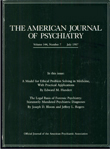The American Psychiatric Press Review of Psychiatry, vol. 16
This volume is a significant contribution to the series, which summarizes the latest and most effective treatments for psychiatric disorders. Volume 16 includes sections on Cognitive Therapy, Repressed Memories, Obsessive-Compulsive Disorder Across the Life Cycle, Psychopharmacology Across the Life Cycle, Psychological and Biological Assessment at the Turn of the Century, and Computers, the Patient, and the Psychiatrist. The editors, with the help of many outstanding clinicians and researchers, have constructed a practical and thoughtful compilation of clinical and research data for the psychiatrist.
The Cognitive Therapy section, edited by Drs. Jesse Wright and Michael Thase, is a state-of-the-art synopsis of cognitive theory, a discussion of how theory and empirical data shape treatments, and a review of outcome data. A chapter on the treatment of anxiety disorders discusses diagnosis, treatment, and outcome data for panic disorder, social phobia, and general anxiety disorder. Two chapters discuss the use of cognitive therapy for the treatment of substance and personality disorders. These chapters are particularly effective in using vignettes and tables as a starting point for the clinician as well as figures that organize diagnostic and treatment principles. The section concludes with a description of the use of cognitive therapy for the treatment of chronic, severe psychiatric disorders (e.g., bipolar disorder and schizophrenia) with an emphasis on improving a patient's adjustment to the illness and adherence to treatment.
Dr. David Spiegel served as the editor for the Repressed Memories section, which is an outstanding synthesis of the experimental and clinical literature. The section will help clinicians to rethink what we know about the topic, to acknowledge what we still do not know, and how best to understand and use the memories that patients provide. The topics discussed include the effects of traumatic experience on memory, the underpinnings of repressed memories, and the subtle processes of intentional forgetting and voluntary thought suppression. One chapter also discusses research findings about memory retrieval facilitators (e.g., hypnosis), which may influence confidence in memory more than content, producing “confident errors.”
The Obsessive-Compulsive Disorder Across the Life Cycle section, edited by Drs. Michelle Pato and Gail Steketee, includes chapters on the management of obsessive-compulsive disorder in children and adolescents, in adults and older adults, and in pregnancy and the puerperium. It identifies commonalities across the life cycle and points to differences that require modification of management by the clinician.
Dr. Susan McElroy edited Psychopharmacology Across the Life Cycle, which provides an exceptional review of psychopharmacological treatment of psychiatric disorders. The chapters by Drs. Keck and McElroy on pharmacology for the psychoses and bipolar disorder, respectively, are practical and thorough. The chapter on the treatment of attention deficit hyperactivity disorder is also outstanding in its synthesis of information and use of figures, tables, and algorithms. The final chapters provide an update on pharmacological treatments for a wide array of disorders in children, adolescents, and older adults, as well as the principles that govern the use of medication in these populations.
The final two sections of the book will help the psychiatrist practice in the current health care environment. Psychological and Biological Assessment at the Turn of the Century, edited by Drs. John Clarkin and John Docherty, focuses on efficient and mindful use of laboratory services, psychological assessment, and instruments for measuring outcome. The final section, Computers, the Patient, and the Psychiatrist, edited by Dr. Zebulon Tainter, highlights opportunities for using computer technology (e.g., the Internet and information systems) for patient care and administrative purposes. This section provides an interesting preview of psychiatric practice in the year 2005, although a discussion of telemedicine is conspicuously absent.
The American Psychiatric Press Review of Psychiatry, vol. 16, is a valuable source of information for psychiatrists, providing an update on cognitive therapy, repressed memories, obsessive-compulsive disorder, psychopharmacology, biological and psychological assessment, and uses of computers for patient care. It serves as a straightforward synopsis for reading or may be useful for reference. The editors, contributing authors, and the American Psychiatric Press are to be congratulated for such a rich contribution to the field.



